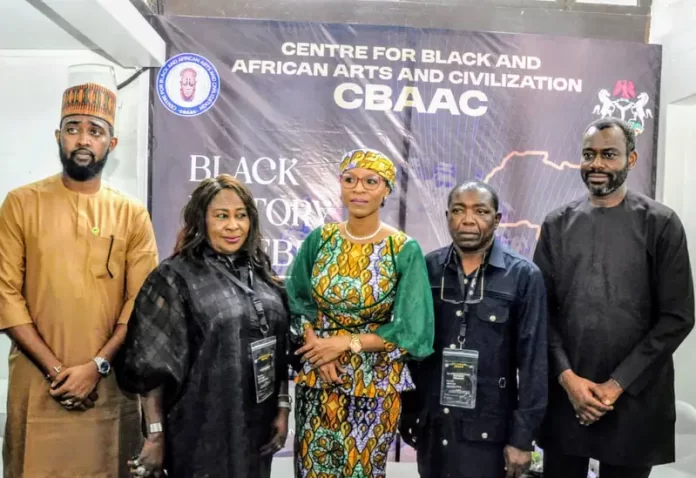The annual celebration of Black History Month honors the rich cultural heritage, achievements, and contributions of Black people throughout history.
For 2024, the Centre for Black and African Arts and Civilisation (CBAAC) hosted a series of events dedicated to celebrating the past, present, and future of the African Diaspora.
One of the key programs, held last week at the MAD House, University of Lagos, focused on recognizing the significant contributions of Africans in the Diaspora and the importance of Africans telling their own stories.
Supported by Sterling Bank, the event gathered notable figures including Hannatu Musa Musawa, the Honorable Minister of the Federal Ministry of Arts, Culture, Tourism, and Creative Economy, represented by the Director-General of the National Gallery of Arts, along with government officials, art and culture enthusiasts, and students.
The 2024 Black History Month theme was “Resilience, Innovation, and Unity: Strengthening the African Diaspora.” CBAAC’s Director-General, Hon. Aisha Adamu Augie, explained that “Resilience reflects the enduring strength and perseverance of African-descended people throughout history. Despite centuries of enslavement, colonization, systemic racism, and various forms of oppression, the African Diaspora has continuously demonstrated remarkable resilience.” This theme underscored how historical challenges were met with resistance, courage, and determination.
The event also showcased the profound impact the African Diaspora has had on global culture, science, technology, and intellectual thought. From African art, music, and dance to groundbreaking inventions and innovations, the Diaspora’s contributions have shaped the world in many ways.
Hon. Aisha Adamu Augie added, “Africans have often been portrayed negatively, but we are beautiful, great people who have contributed to the development of the entire world in all spheres of life.”
Abubakar Suleiman, Managing Director of Sterling Bank, echoed these sentiments, stating, “We believe that if we don’t tell our own story, someone else will. That’s why we support various art events like the Ake Festival and book tours across the country. We want people to read, understand our history, and pass it on.”
He continued, “CBAAC’s month-long program sets a new agenda for younger generations. It’s important that they engage with these programs, like the one at the University of Lagos, where an experienced professor can share his insights and history. We also hope to encourage students to read more and, in the future, write their own stories.”
In his keynote speech, Dr. Britto Bonifacio Aderemi, Senior Lecturer in the Department of History and International Studies at Lagos State University, discussed Africa’s painful history of suffering due to European colonization and the dehumanization of Africans. He noted that the African slave trade led to the loss of African names and identities, yet, in some ways, Africa’s cultures spread across the world.
Dr. Aderemi also reflected on the paradox of African migration, noting that while the earliest Africans were forcibly taken overseas, today’s generation is voluntarily leaving in what is known as the “Japa syndrome” in Nigeria.
The celebration featured a panel discussion on the theme, “Resilience, Innovation, and Unity: Strengthening the African Diaspora.” Panelists included Prince Jon James Olomo, founder of Tribal Tapestry; Amb. Nneka Isaac-Moses, co-founder of Goge Africa; Osarume Akenzua, leadership expert; and Dr. Kehinde Adepegba, artist and art critic. They discussed the importance of resilience, overcoming challenges, and using creativity and innovation to empower future generations.
Amb. Isaac-Moses emphasized Nigeria’s soft power in the creative industries, particularly in fashion, music, and visual arts. She urged Nigerian leaders to harness the country’s cultural wealth for national development and stressed the importance of preserving indigenous languages in families.
Prince Olomo, known as Prince Omowale, discussed how technology, such as DNA testing, has helped reconnect lost African identities in the Diaspora. He also pointed to the role of literature in reshaping global perceptions of Africa, encouraging Africans to continue writing and telling their own stories.
